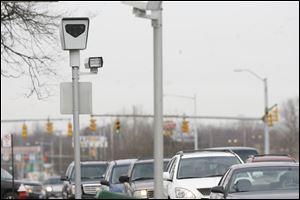
OHIO SUPREME COURT
No decision yet on hearing process for traffic cameras
6/11/2014
Toledo has been using red-light cameras since 2001.
COLUMBUS — Toledo’s traffic enforcement cameras may survive, but a ruling from the Ohio Supreme Court striking down the program’s administrative hearing process would have “untold consequences” across the state, the city argued today.
But a lawyer for a Kentucky man challenging the process countered that the city has unconstitutionally carved out an exception for itself to sidestep the jurisdiction of Toledo Municipal Court in deciding guilt or innocence when it comes to these civil violations.
The high court did not immediately rule, and, based on their questions, appeared divided.
This marks the second time that the highest court has considered the constitutionality of such cameras. It previously upheld such programs generally as an extension of cities’ home rule authority and found they do not conflict with state law.
But this is the first time it has heard the argument raised by Bradley L. Walker that the program unconstitutionally usurps the authority of the municipal court to hear motorists’ challenges to traffic citations. Appeals to administrative hearing decisions go instead to Lucas County Common Pleas Court, as do other administrative code violations.
Mr. Walker paid the $120 fine for the ticket he received in 2009, but then filed his lawsuit.
“Walker has alleged they have my money under this unconstitutional ordinance, and I want it back,” said Mr. Walker’s Fremont attorney, Andrew R. Mayle.
The city contends that the camera-related offenses are different from criminal violations and that it has authority to frame an administrative process under its home-rule authority. In addition to a common pleas court appeal, motorists can still file a separate action in municipal court to challenge a city’s action.
Adam Loukx, the city’s law director, told the court that the cameras will survive.
But a decision striking down the city’s right to pursue an administrative hearing process to process citations would “have untold consequences and establish a very negative precedent around the state.”
Although the court previously upheld the constitutionality of such cameras, one of the justices who has since joined the court, Justice William O‘Neill, suggested that decision created “the legal fancy that traffic violations are civil violations.”
Justice Paul Pfeifer suggested such an administrative hearing process could turn common pleas courts into traffic courts, although Mr. Loukx said he knows of only a handful of appeals that have been filed.
In addition to the courts, automatic red light and speed enforcement faces challenges in the halls of the Statehouse, where bills have been introduced to either regulate or all but ban their use. A bill is expected to be considered when lawmakers return to Columbus this fall.
Cities like Cleveland, Columbus, and Dayton were also watching today’s arguments, knowing that their own similar programs could face the same fate if Toledo’s pioneering program is struck down.
Programs differ from city to city, but they generally treat violations captured by a camera as civil violations that carry a fine that is split by the city and the private company operating the cameras. Toledo’s operator, Redflex Traffic Systems, stood at the city’s side today in arguing the case.
Unlike a criminal violation, the citations do not assess points against a driver’s license and motorists’ insurance companies are not notified.
A pair of bills awaits lawmakers when they return to the Statehouse in late September, spurred on by the argument that the cameras have become more about generating revenue for cities and less about safety.
One would outright ban cameras for red-light enforcement and permit their use for speed enforcement only in 20 mph school zones, and only then when a police office is present to witness the violation.
Another would allow the use of cameras only when a police office is present, something camera cities contend would negate the benefits of such a program in the first place.
Former Justice Andrew Douglas sat at the table with the attorneys for the city and Redflex before the bench. Only one of the current justices, Justice Pfeifer, was on the bench when he served.